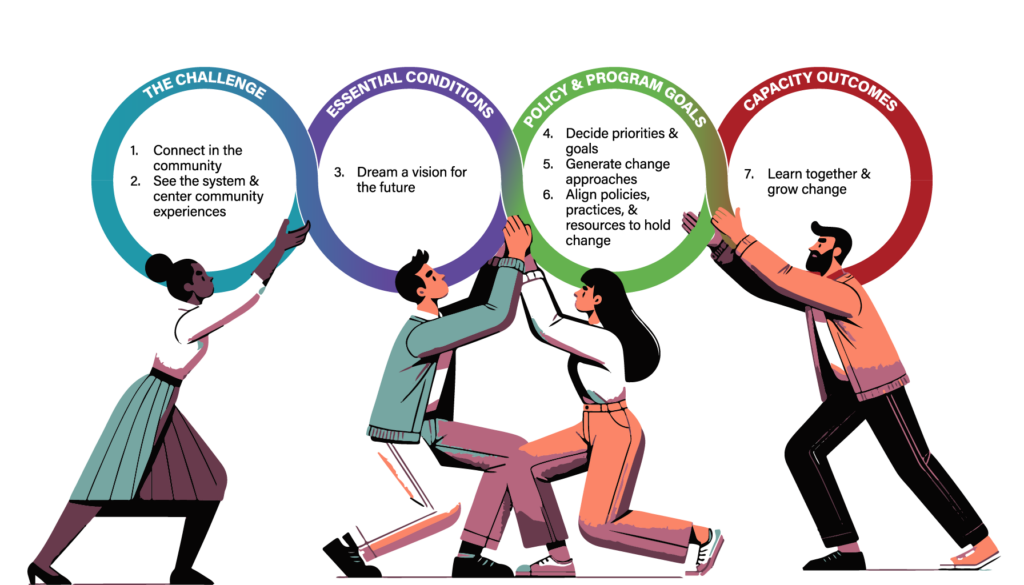Element 2: See the System and Center Community Experiences
Learning together with students, family members, community partners, and school and district staff about how education systems have been designed to serve some communities and not others can help uncover new understandings of the system conditions that must shift to generate equity and opportunity. This involves exploring the history and impact of systemic oppression on communities, how systems have been designed and then experienced over time and by different groups, and how these systems are experienced by community members today at the individual, interpersonal, and systemic levels.
Case Story

Research has shown that storytelling can help practitioners develop empathy and, in some cases, connect with and care for others more effectively (Fairbairn, 2002). At Forest Park Middle School, administrators, students, and teachers worked together in a “circle team” to review data that informs their climate and culture efforts. When reviewing behavior data over a five-year period, school leaders were surprised to find that Black boys were disproportionately suspended and disciplined at far higher rates than their peers. To understand how this disproportionate pattern impacted their own tight-knit community, the circle team conducted empathy interviews to learn about students’ experiences of disciplinary processes at the school. These interviews helped illustrate how power and bias inform everyday interactions between teachers and students. These qualitative interviews have helped Forest Park teachers become more self-reflective of their own biases and blind spots. Listen to this case story clip to hear former Forest Park Principal Tiffany Brunson share about how engaging in deep listening to a student’s story shifted her mental model regarding the disciplinary process at her school.
Reflection Pause
- Think about a time you heard a personal story that changed your understanding (or mental model) of an issue or an experience. This could be a conversation you had with a student or community member, or even a memoir you read. How did listening to someone’s personal story impact your understanding of a person, community, or system?
- What opportunities might there be to expand or strengthen efforts in your school or district to listen to and learn from community experiences?
Root Cause Analysis Exercise
- Generate an Equity Challenge Statement: What is an equity challenge you or your team need to solve? Express the challenge in one sentence.
- Initial Root Cause Brainstorm: Based on your own understanding of the equity challenge, brainstorm as many causes as you can that might be contributing to the challenge. Write each cause down (if possible, write each cause on a separate post-it).
- Share & Categorize: Group any causes that seem related together and give each category a title.
Suggested Next Step: Share your initial brainstorm with community members so that you can build on each other’s ideas and explore new causes that may be contributing to your equity challenge. Engage in collective sense-making, grounded in these questions: Does your diagram capture the root causes you think are important? Are there any causes that might be missing or that you need to dig further into?
Resources to Explore
- 5 Whys for Inquiry: An inquiry tool that can be used to help understand the root cause of an issue
- Empathy Interviews: An approach to interviewing that elicits deeper understanding and empathy for an individual’s lived experiences.
- Ten Ways to Collect Street Data: A list of activities for gathering and learning from street data.
Fairbairn, G. J. (2002). Ethics, empathy and storytelling in professional development. Learning in Health and Social Care, 1(1), 22-32.
Beyond SEL. WestEd. https://beyondsel.wested.org/audiocast/co-creating-an-equitable-school-climate-with-students/
Yosso, T. J. (2005). Whose culture has capital? A critical race theory discussion of community cultural wealth. Race Ethnicity and Education, 8(1), 69–91. https://doi.org/10.1080/1361332052000341006

